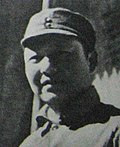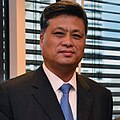List of Chinese Communist Party Committee Secretaries
| No. | Image | Name | Term start | Term end | Ref. |
|---|---|---|---|---|---|
| 1 |  | Ye Jianying (叶剑英) | August 1949 | July 1955 | [2] |
| 2 |  | Tao Zhu (陶铸) | July 1955 | February 1965 | [3] |
| 3 |  | Zhao Ziyang (赵紫阳) | February 1965 | March 1967 | [3] |
| 4 |  | Huang Yongsheng (黄永胜) | February 1968 | November 1969 | [3] |
| 5 |  | Liu Xingyuan (刘兴元) | November 1969 | December 1972 | [3] |
| 6 |  | Ding Sheng (丁盛) | December 1972 | December 1973 | [3] |
| 7 |  | Zhao Ziyang (赵紫阳) | April 1974 | October 1975 | [3] |
| 8 |  | Wei Guoqing (韦国清) | October 1975 | December 1978 | [3] |
| 9 |  | Xi Zhongxun (习仲勋) | December 1978 | November 1980 | [3] |
| 10 | Ren Zhongyi (任仲夷) | November 1980 | July 1985 | [3] | |
| 11 | Lin Ruo (林若) | July 1985 | January 1991 | [3] | |
| 12 | Xie Fei (谢非) | January 1991 | March 1998 | [3] | |
| 13 |  | Li Changchun (李长春) | March 1998 | November 2002 | [4] |
| 14 |  | Zhang Dejiang (张德江) | 24 December 2002 | 1 December 2007 | [5] |
| 15 |  | Wang Yang (汪洋) | 1 December 2007 | 18 December 2012 | [6] |
| 16 |  | Hu Chunhua (胡春华) | 28 December 2012 | 28 October 2017 | [7] [6] |
| 17 |  | Li Xi (李希) | 28 October 2017 | 28 October 2022 | [8] |
| 18 |  | Huang Kunming (黄坤明) | 28 October 2022 | incumbent | [9] |






